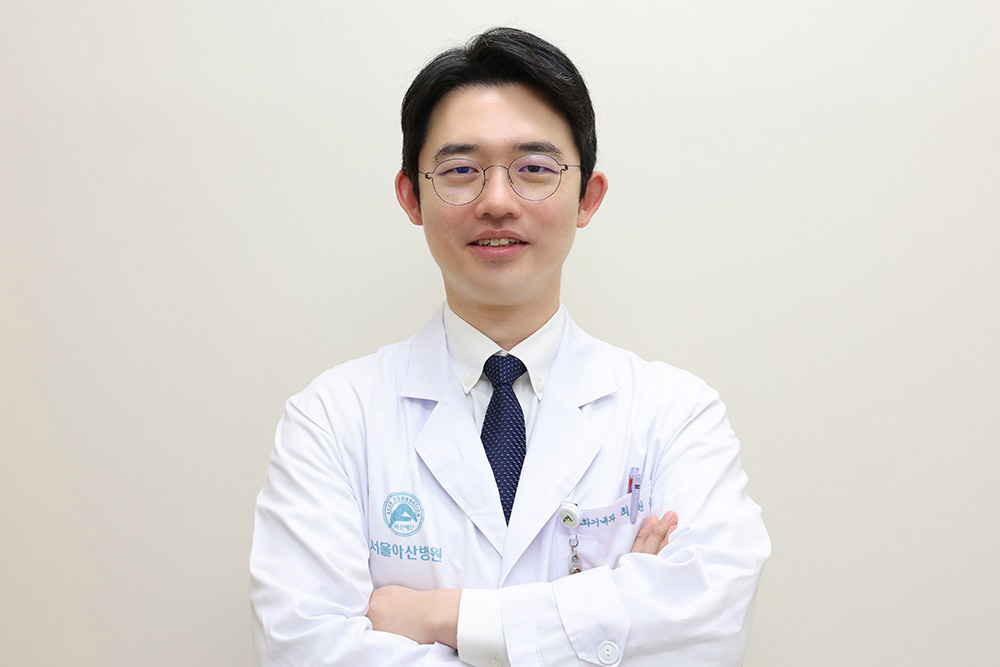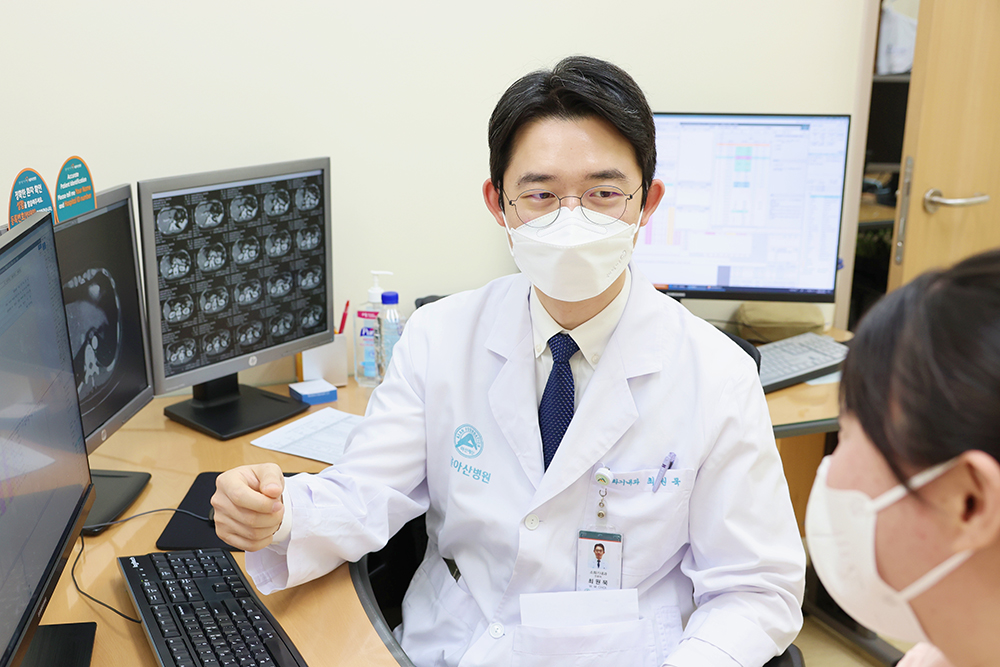-
- Global AMC MENU
- NEWS
- HEALTH
- PEOPLE
- Introduction
Professor Won-Mook Choi, Division of Gastroenterology

▲ Professor Won-Mook Choi of the Division of Gastroenterology at Asan Medical Center
Chronic hepatitis B can easily lead to liver cancer, and liver cancer is a challenging disease to treat with uncertainty in full recovery. Therefore, patients often experience anxiety. Professor Won-Mook Choi of the Division of Gastroenterology at Asan Medical Center always advises not to dwell on what has already happened but to focus on facing the situation at hand. He is also fully committed to preparing the patient’s optimistic tomorrow by actively engaging in treatment and research.
Being Active Every Moment
“I have always actively approached patients ever since I was a student. That is how one can learn and gain something. Once I developed the mindset to look closely and find clues that would contribute to treatment, I became more confident with my voice and attitude starting to change.” During his internship, he wrote a detailed referral for a patient with acute hepatitis. His professor was impressed and suggested Professor Choi join the Division of Gastroenterology. This led him to choose gastroenterology, and he now treats patients with chronic hepatitis B, liver cirrhosis, and liver cancer. The liver is the largest organ in the human body, and when something goes wrong, it requires comprehensive consideration because it affects the entire body. In particular, the lack of standardized treatment for liver cancer has sparked his spirit of challenge, as the prognosis for patients can vary depending on which doctor they see. This has also come with significant responsibility. “When a patient suddenly deteriorates, a value judgment must be made. Should immediate critical care be pursued? Can they endure until a liver transplantation? Would it be better to provide comfort care instead? It is a question without a definitive answer. When considering various factors, decisions are sometimes made almost as if by fate. I listen to the opinions of various medical specialties, but when still in doubt or when objectivity wavers, I think about my family. My decision should be one I would recommend to my own. Then, patients would trust and follow me.”
When he decided to specialize in liver diseases, he heard concerns that hepatitis B, the primary cause of liver diseases, would one day become obsolete with decreasing prevalence due to widespread vaccination. “I thought it would be meaningful to treat patients eagerly when young, gradually see fewer patients, and eventually reach the end of a lifelong study. Liver cancer patients are still increasing, with 70% of the cases caused by chronic hepatitis B. There is still much work to be done.”
Yet, Reasons for Optimism
Recently, an inpatient became anxious upon stopping chemotherapy due to severe side effects. Professor Choi, despite the apparent worsening conditions, persuaded the patient by citing instances where patients who concentrated on their present circumstances eventually showed improvement. Consequently, he encouraged the patient to exert their best efforts in restoring liver function. “My life motto is to do my best at this moment. My words seem to have resonated, as the patient’s face is much brighter these days.” Liver cancer often recurs because of the lingering effects of underlying hepatitis B or liver cirrhosis. Still, Professor Choi does not give up hope because complete recovery may be achieved through liver transplantation, and he has seen dramatic recoveries. “I feel happy and grateful when patients who were expecting the worst undergo liver transplantation, chemotherapy, or radioembolization and come back for outpatient sessions in good health. I am greatly encouraged by such cases. In fact, the patients have endured well.”
Earlier, when he had little experience in treatment, Professor Choi performed high-dose radioembolization on a patient with a huge liver tumor and decided to wait and see the patient’s progress before resorting to surgery. The nurse in charge asked him to confirm the radiation dose and whether to proceed as planned because the dose was too high. Professor Choi was unexpectedly frightened then. “I hesitated for a moment, but I trusted the radiology team and proceeded. The patient has been making outpatient visits for more than two years with no complications or recurrence. I experience a virtuous cycle every day, which is made possible only at Asan Medical Center. As many patients visit Asan Medical Center with trust, my clinical experience is rapidly accumulating.”

▲ Professor Won-Mook Choi is consulting a liver disease patient
The Doctor Preparing Hope
Professor Choi’s father has always talked about the professional pride in being able to help others as a practitioner. Professor Choi felt the same way and dreamed of becoming a researcher and educator who could help more patients. After completing his residency, he entered the Graduate School of Medical Science and Engineering at KAIST to pursue basic research. It was a series of processes involving going back to square one if an experiment failed due to minor reasons. Despite feeling powerless at times, his consistent research led to the completion of a paper on the pathogenesis of alcohol-induced liver disease and liver fibrosis. This was followed by various awards and further research opportunities.
Currently, hepatitis B can be treated with medication to reduce the risk of liver cancer, but the treatment coverage is limited. Professor Choi is working with Professor Young-Suk Lim to study the grounds and methods to identify patients and expand treatment coverages, expanding the global guidelines. “It is always dark at the beginning of research. Relying on the joy that comes from immersion, I stumble upon the thrill of discovering something new. Tasting that, every moment becomes invaluable. I aspire to be a doctor who prepares hope for the future so patients can focus on today.”












